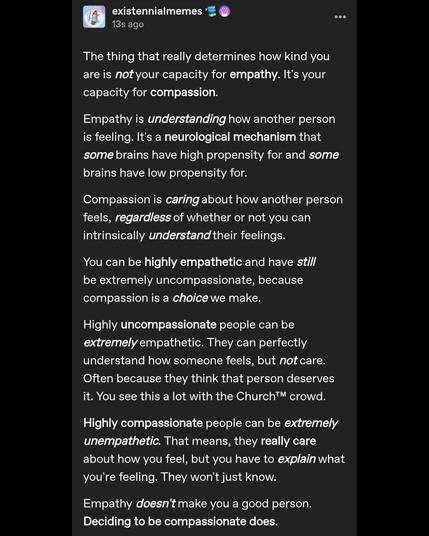This is so, so important for my fellow autistics to understand. A lot of us get concerned we're not "good people" because we struggle to understand others.
Thanks, that makes some things much clearer to me.
I coined the term "intellectual empathy" to describe this. Hell, even if I weren't autistic, I'm too traumatized and numb to feel other's feelings, but I'm vociferously, courageously compassionate to everyone I meet. I carry no bigotry at all and treat everyone with dignity, kindness, and respect.
At least, until they give me a personal reason not to. Then I can be a real prick. I'm not jesus over here.
Edit: Torturers have a lot of empathy. They have to to do their job well.
@aubreyjones I find posts like this really problematic.
Empathy is a broad, complex topic, that is still not very well researched and has conflicting definitions.
Depending on the definition, compassion is a form of empathy, or narcissists who want to "put homeless people out of their misery" could be described as compassionate.
The purpose of this post is to make some people feel better about themself, but not to teach you anything.
Don't surrender the definition of empathy to neurotypicals.
I totally agree that these terms are ill-defined. I think that's what the post is talking about. Why I forwarded it.
Most autistics struggle somewhat with intuitively, automatically understanding what another person is feeling. Many of our therapists and "experts" call this activity "empathy". They say that autistic people often "lack empathy", and many autistics consequently identify their own struggle with emotion-identification as them "lacking empathy".
But then there's this quote, which antifascist NTs pass around, from the Nuremberg Trials by some random army captain: "Evil, I think, is the absence of empathy."
And autistics who have taken to understand they "lack empathy", and who very much feel *targeted* by fascism more than supporting it, and who identify with its historical and current victims, naturally feel very upset because this thing they cannot change means they "are evil" in some essential way.
And so the point of this post is to say that it isn't struggling with automatically identifying other people's emotions that makes a person evil, even *if* that quote uses the same word your therapist uses.
Rather the original quote about evil intends to convey that *not caring* about somebody else's feelings is actually what makes a person evil.
The fact that the post does this by defining "compassion" is simply Aristotelian reflex.
(Also, to be clear, I don't think that the original post is trying to say that "caring about someone's feelings" is necessary and sufficient for someone to be "not evil". Only that if someone really doesn't care about others' feelings even when they understand them, they're probably not good.)
@aubreyjones But without speculating on what this person probably meant, does this really look like a good statement to you?
Defining empathy vaguely as cognitive empathy, despite the "layperson definition" focusing more on emotional and affective empathy, or portraying compassion as a conscious choice, when it's typically an emotional reaction and depending on the definition, included into empathy.
This post risks worsening peoples ability to understand and communicate their experience.
@aubreyjones I don't doubt, that this post was written with good intentions, but does it really have the potential for more use than harm?
I once heard an autistic person saying, that they don't feel love.
What this person probably meant, was that they're Aro/Ace, but this belief, that they probably learnt early, that they "can't love", lead to them struggling to make connections with others.
I worry about people internalising the vague and barely defined message "I don't have empathy".
Many ND people have already internalized "I don't have empathy", and are being hurt right now by the "no empathy is evil" quote. This speaks to that directly.
If you're already immune to that because you've been thinking about empathy specifically, that's awesome. But I find the post quite positive, and I find definitions of words arbitrary and context-dependent anyway.
@aubreyjones If the definition of words is arbitrary, then the context, which is also made up of words, is also arbitrary.
In this case, there would be no way to determine, what the person actually meant and it would be up the everyones personal interpretation and "taste".
In other words, if ND people are hurt by the "no empathy is evil" quote, they should have simply interpreted the quote differently by your logic, including the person posting this.
Do you really not see the problem here?
I'm sorry this post doesn't meet your standards. It meets mine. I don't see any evidence people are interpreting it the way you're worried they will. I don't see a problem. Sorry.
It was in the context of them explaining to others what autism is, so it wasn't just "this is my personal individual experience", but "this is what autistic people are like".
In the situation, it came across as not feeling affection and then struggling to explain why they even want to spend time with others and have friends.
It sounded like them trying to explain their experience within the framework of outdated autism cliches.
the terminology is vague (and as an autistic person I HATE linguistic ambiguity)
If you try to understand other people, then thats good enough. You don't have to be good at interpreting body language or naming emotions (I am bad at it).
I don't care what the word is. Just try to be a decent person.
Don't discount the double empathy problem. Many people have a hard time accepting that they got something wrong, and assume everyone else knows that this is difficult. I don't have a hard time doing this, which means if I put myself in someone else's shoes, I come to the conclusion that bluntly telling them that they're wrong is fine.
Meanwhile, being misunderstood in a toot, or timing when to acknowledge someone I know when approaching in a long corridor can break me for a day.
@aubreyjones Specific terms aside, *understanding* how someone else feels and *not caring* about how the other person feels is a cornerstone of many manipulative, oppressive/overbearing, controlling, abusive tactics.
I think the post you screenshotted makes a good argument for the two concepts being orthogonal.
It's a bit like some people just can't seem to learn any second language but that doesn't mean they're all xenophobes or smth.




